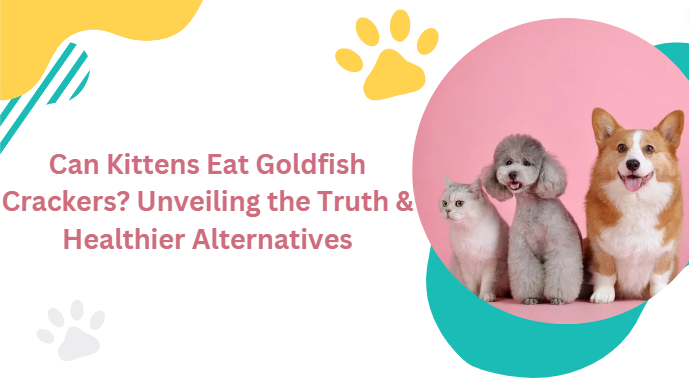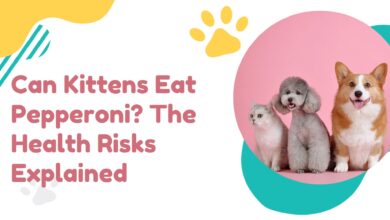Can Kittens Eat Goldfish Crackers? Unveiling the Truth & Healthier Alternatives
Can Kittens Eat Goldfish Crackers? Plus, Good Treat Alternatives!

Feline Nutrition and Common Household Snacks
Understanding the dietary needs of our feline friends is crucial for their well-being.
Kittens are obligate carnivores, meaning their diet should primarily consist of meat.
This fundamental aspect of feline nutrition underpins the importance of selecting the right foods to ensure our kittens not only survive but thrive.
In the delightful world of pet care, one question often emerges from the pantry: Can kittens eat Goldfish crackers?
This seemingly innocent query opens a broader discussion on the suitability of common household snacks for our whiskered companions.
The Nutritional Profile of Goldfish Crackers
The nutritional profile of Goldfish crackers, a popular human snack, showcases ingredients that are far removed from what would be considered ideal in a kitten’s diet.
Kittens have unique dietary requirements that snacks like Goldfish crackers cannot meet.
For more detailed insights into what constitutes appropriate feline nutrition, resources like the ASPCA’s guide to foods that are safe for kittens offer invaluable information.
Balancing a kitten’s diet with their nutritional needs is key to their health.
Unlike humans, kittens do not benefit from a diet high in carbohydrates and fillers, which are common in many processed snacks.
Instead, their bodies are designed to digest and use proteins and fats more efficiently.
The inclusion of potentially harmful ingredients in Goldfish crackers, such as onion and garlic powders, only adds to the concerns.
These ingredients are known to be toxic to kittens, leading to issues such as gastrointestinal distress and even anemia.
For a comprehensive understanding of feline dietary needs, PetMD’s overview is a must-read.
Also Read: Can Kittens Eat Pepperoni?
Interactive Quiz: Are You Ready?
To bring a unique and engaging twist to this discussion, let’s introduce an Interactive Kitten Nutrition Quiz.
This interactive feature will allow readers to test their knowledge of what foods are safe for kittens, including the safety of feeding them Goldfish crackers and other common human snacks.
The quiz will challenge misconceptions and educate kitten owners on the complexities of feline nutrition, reinforcing key points with explanations for correct and incorrect answers.
When considering the nutritional well-being of our feline friends, it’s essential to:
- Understand that kittens are obligate carnivores with specific dietary needs.
- Recognize that human snacks, including Goldfish crackers, often contain ingredients that are not suitable for kittens.
- Opt for kitten-specific treats and foods that align with their natural dietary requirements.
While sharing a snack with our pets can be a bonding experience, ensuring that these treats do not compromise their health is crucial.
Kittens’ unique dietary needs make it imperative to approach their diet with knowledge and care, avoiding snacks that are tailored for human consumption.
The interactive quiz mentioned above will serve as a fun and informative way to deepen your understanding of kitten nutrition, helping you make informed decisions about your pet’s diet.
This approach not only prioritizes the health and happiness of our kittens but also enriches our journey as responsible pet owners.
Risks Associated with Feeding Goldfish Crackers to Kittens
Feeding our feline friends snacks that are designed for human consumption, such as Goldfish crackers, carries risks that every pet owner should be aware of.
Understanding these risks is crucial in ensuring the health and well-being of our beloved kittens.
Here, we delve into the potential dangers and why these snacks are not suitable for our furry companions.
Understanding the Risks
- Sodium and Seasonings: Goldfish crackers are known for their savory taste, which comes from a mix of sodium and seasonings.
While these flavors appeal to human palates, they can pose significant health risks to kittens.
High sodium levels can lead to sodium poisoning, characterized by symptoms such as excessive thirst, urination, and even neurological problems in severe cases.
The spices and additives, including onion and garlic powders, are toxic to kittens and can cause gastrointestinal upset and red blood cell damage.
- High sodium content can lead to dehydration and sodium poisoning.
- Onion and garlic toxicity can cause gastrointestinal distress and anemia.
- Allergens and Additives: Many kittens have allergies or sensitivities to certain food additives, including the MSG and yeast found in Goldfish crackers.
These can lead to allergic reactions, causing symptoms such as itching, swelling, and digestive issues.
Moreover, the lactose in these snacks can cause problems for lactose-intolerant kittens, leading to bloating and diarrhea.
- MSG and yeast may trigger allergic reactions.
- Lactose intolerance can result in gastrointestinal discomfort.
- Fats and Oils: The oils used in Goldfish crackers, such as canola, soybean, and sunflower oil, are not beneficial for kittens.
While kittens require a certain amount of fat in their diets, the types and amounts found in these crackers do not meet the nutritional standards necessary for feline health. Excessive intake can contribute to obesity and related health issues.
- Unhealthy fats can lead to obesity and other health problems.
- Choking Hazards and Digestive Issues: The dry and crunchy nature of Goldfish crackers poses a choking risk, especially for kittens.
Furthermore, the processed nature of these snacks can lead to digestive discomfort, as kittens’ digestive systems are not designed to handle heavily processed foods.
- Choking hazard due to the crackers’ size and shape.
- Digestive discomfort from processed ingredients.
A Healthier Alternative: DIY Healthy Kitten Treat Recipes
Instead of sharing snacks that are made for humans, consider preparing DIY healthy kitten treat recipes.
These homemade treats can be tailored to meet the nutritional needs of your kitten, ensuring they are both safe and beneficial. Here are a few ideas to get you started:
- Protein-Packed Treats: Use cooked chicken, turkey, or fish as the base for these treats. Ensure all bones are removed and avoid adding any seasoning.
- Veggie Bites: For kittens who enjoy vegetables, small pieces of steamed carrots or broccoli can make for a healthy snack.
- Freeze-Dried Delights: Puree meat or fish and freeze-dry them at home for a crunchy treat that’s rich in protein.
Creating your kitten treats not only allows you to control the ingredients, ensuring they are safe and healthy for your pet, but it also provides an opportunity to bond with your kitten through food.
Plus, it’s a fun and rewarding activity that any pet owner can enjoy.
Safe Alternatives and Dietary Recommendations
Navigating the maze of kitten nutrition can often feel overwhelming, especially when trying to substitute human snacks like Goldfish crackers with healthier alternatives.
Understanding the dietary needs of your feline friend is key to ensuring their long-term health and happiness.
Here, we explore safe alternatives and dietary recommendations that cater to the unique nutritional requirements of kittens.
Embrace the Basics: Safe Human Foods
kittens can enjoy a variety of human foods that are safe and beneficial for their diet. Here’s a quick guide to get you started:
- Lean Proteins: Cooked chicken, turkey, and lean beef are excellent protein sources for kittens. Ensure they are cooked without harmful seasonings or oils.
- Fish: Cooked salmon and tuna can provide omega-3 fatty acids, beneficial for your kitten’s coat and skin health. Avoid canned fish in oil or brine.
- Eggs: Cooked eggs are a great source of protein. Ensure they are fully cooked to avoid the risk of salmonella.
Remember, moderation is key. These foods should complement your kitten’s diet, not replace their regular kitten food.
Also Read: Can Kittens Eat Greenies?
Commercial kitten Treats: What to Look For
Commercial kitten treats can be a convenient option, but it’s important to choose wisely:
- High Protein, Low Carb: Look for treats that mimic a kitten’s natural diet: high in protein and low in carbohydrates.
- Natural Ingredients: Opt for treats with simple, natural ingredients and without artificial additives or fillers.
- Specific Needs: Consider treats formulated for specific health concerns, such as dental health or hairball control.
Consulting the Experts
Always consult with your veterinarian before introducing new foods into your kitten’s diet, especially if they have existing health conditions. They can provide personalized advice that considers your kitten’s health, age, and nutritional needs.
DIY Treats: A Creative Twist
Making your kitten treats at home can be a fun and rewarding way to ensure your pet is eating healthy. From baked fish flakes to meaty jerky, the possibilities are endless. Start with simple recipes and experiment to find what your kitten loves.
Kitten Owner Testimonials: Real Stories, Real Advice
Hearing from other kitten owners can provide valuable insights and inspiration. Here are a few testimonials:
- John’s Story: “After switching to homemade chicken treats, I noticed a significant improvement in my kitten’s energy levels and coat condition.”
- Linda’s Experience: “Incorporating small portions of cooked salmon into my kitten’s diet has helped with her dry skin issues.”
These stories highlight the positive impact that dietary changes can have on our feline friends, emphasizing the importance of thoughtful food choices.
Final Thoughts
Feeding your kitten doesn’t have to be a complicated affair filled with unsafe human snacks. By focusing on safe alternatives, consulting with professionals, and even getting creative in the kitchen, you can provide your kitten with a diet that’s not only nutritious but also enjoyable.
Remember, a healthy kitten is a happy kitten, and with a little effort, you can ensure your feline friend enjoys the best possible quality of life.

